His work is a model of Biblical balance, in the best meaning of the word.
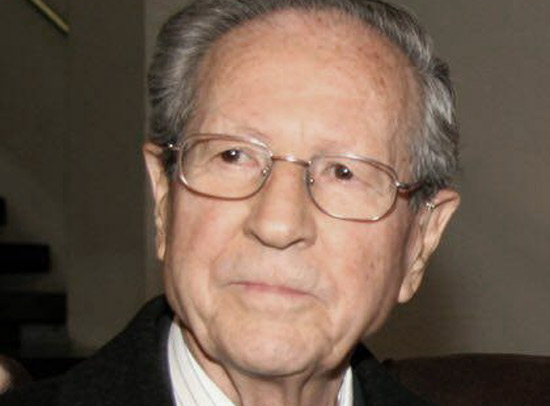 José María Martínez.
José María Martínez.
Although there are still many believers that eye theology with suspicion –disdain even –, considering it to be arid and of little practical value, this is not the case of the work of Spanish theologian José Maria Martínez (1924–2016).
Knowledge meets spirituality in a body of work that considers that “faith feeds off the knowledge of the truth revealed by God in his Word”. If faith is born from the World of God, this reaches us through the Bible, which should be taken as “worthy of all respect, trust and submission”. Given that “faith is not a question of rationality but of authority”, which, in our modern day, Martínez realised was not a distinctive characteristic of certain theological sectors.
In his work on the “Theological Foundations of the Christian Faith” (Fundamentos Teológicos de la Fe Cristiana, 2002), the author confesses that, although he received a conservative theological education, he felt the need to submit his convictions to an in-depth review, “comparing them with the conceptions of less conservative, neo-orthodox or clearly liberal theologians”. His “extensive reading and a strong dose of personal reflexion came to confirm the fundamental elements” of “his previous beliefs, however nuancing them on certain points”.
José María Martínez’s theology is therefore faithful to the fundamentals – some would call him a fundamentalist, but he preferred the word conservative –, but open to theological reflection owing to his extensive reading, especially of German authors. He was conservative because “when it comes to reading the work of modern theologians, critical caution is advisable”, but his position was that of classical Christian evangelism, alert to the challenges of the contemporary world.
In the theological journal that he directed in the 1990s, he even warned that “the most radical fundamentalists have adopted sectarian attitudes, in extreme positions from which they bitterly condemn those who do not militate in their ranks”. He observed how some considered that “they alone are pure and faithful, although their purity and fidelity is sometimes reduced to mere legalism, lacking any real basis of Christian piety”.
PASTORAL THEOLOGY
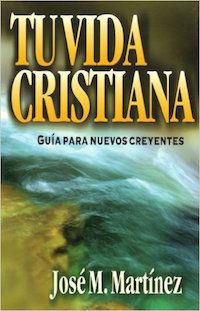 His first book, Your Christian life, is bron out of his work as a pastor in Barcelona.
His first book, Your Christian life, is bron out of his work as a pastor in Barcelona.His first book was entitled “Your Christian life” (Tu Vida Cristiana, 1959) – also known as “Guidebook for new believers” –. It was a result of his work as a pastor in a church in Barcelona, where he saw the conversion of many people and realised how inappropriate the material available at the time was. The book spread rapidly through Spain and Latin America, and even today remains one of the best introductions to Christian life, due to its solid biblical basis and readable style.
The book provides some of the keys to his theology, beginning with the “main event of conversion” – a distinctive feature of the evangelical movement over the centuries–. His treatment of the subject is of particular practical use for pastoral work. The author observes that “importance does not lie in the means of conversion, but in the act itself, to which we all come through repentance for our sins and faith in our Lord Jesus Christ”.
The second chapter addresses the question of the security of salvation, given that “after some time, the joy of salvation starts to be darkened by the clouds of doubt”. The pastor notes that joy decreases, as enthusiasm wanes, because “the change in your conduct has perhaps not been as radical as expected”. His perspective could not be more realistic.
The reaffirmation of the faith, which is a defining feature of all his ministry, has a clearly Christ-centred basis. “The Christian’s salvation, from beginning to end, is the work of Christ”. It is for this reason that in 1966 he published a study of the letter to the Colossians, significantly entitled, “Christ the Incomparable” (Cristo, el Incomparable). Christ is not only the “centre of the Christian message”, but “key to the believer’s new life”. In that line, he established “basic Christology”, rejoicing in “Contemplating the glory of Christ” (Contemplando la Gloria de Cristo, 2004).
He observed that, if you are unsure of your salvation it is “perhaps because you spend too much time looking at yourself and not enough time looking at your Saviour, or because you pay more attention to your feelings than to the Word”. The author in this way establishes an unshakeable foundation whereby “the deep and stable foundation of our security is not dependant on what we do, but on what God has done and will continue doing for us” because “it is not the changing feelings of our soul that save us, but Christ”.
 This is the favourite of Martínez's works for many.
This is the favourite of Martínez's works for many. That concern for faith in conflict led him, in his last years of pastoral ministry, to write a series that would in 1975 be compiled into his book on Job. This is the favourite book of some of those who, like the theologian José Grau, knew Martínez best, because as the author says “countless people have seen the most intense spiritual experiences of their lives reflected [in Job]”.
That interest for the healing of souls – which was how Martínez described the mission of pastors, rather than that hackneyed term of “leadership”– was what made him worry that “pastors could come to be seen as company bosses, constantly involved in board meetings and committees”. He discusses this subject in two excellent tomes, entitled “Ministers of Jesus Christ” (Ministros de Jesucristo, 1977), which inspired the creation of a Theology and Pastoral Psychology Seminar, which the Spanish Evangelical Alliance continues to hold every two years.
BIBLICAL THEOLOGY
As stated by someone with as little suspicion of fundamentalism as Juan José Tamayo: theology is biblical or it is not theology.
Martínez explains this well at the beginning of his manual on “Biblical hermeneutics” (Hermenéutica Bíblica, 1985): “only the intervention of God himself can guide us to knowledge of him and to the great truths concerning our existence”. God has spoken on many occasions and in many ways (He. 1:1-3), but his ultimate Word is given through his Son, by means of the cross, which has to be interpreted by God himself, and not by men.
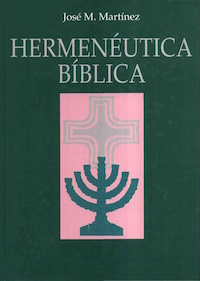 His monumental work on hermeneutics is a textbook in theological seminars in Spain and all of Latin America.
His monumental work on hermeneutics is a textbook in theological seminars in Spain and all of Latin America.Martínez observed, however, that “there is a tendency in contemporary theology to recognise a supernatural revelation without allowing for the supernatural inspiration of the Bible”. This is the belief that it is a “human witness of revelation”, but that it is “exposed to all the defects of human language, including disfiguration and error”. In answer to this he wondered “What would be the point of a witness of revelation, deteriorated by errors, distortions, exaggerations and disfigurations of all kinds?”. For him, “the Bible is the Word of God and, therefore, the ultimate standard of faith and conduct”. Scripture is sufficient.
Martínez said that “the origin of Scripture is both divine and human”. He used the analogy of the double nature of Christ: both human and divine. For that reason, inspiration, while without error, does not annul personality, training or style in Holy Scripture. Just as the Verb humbles itself in incarnation, becoming a servant, so biblical language is not divine or angelic, but rather human. “Scripture reaches us as a servant”, but that “does not mean that the servant has had her hands tied by ambiguity and uncertainty”.
It is from that perspective that he wrote his monumental manual on hermeneutics, which is used as a text book in many seminaries in Spain and Latin America. In fact, one of his last books “Outstanding biblical figures” ( Figuras Estelares de la Biblia, 2007), contains eleven fascinating studies of some of the most important biblical figures in the History of Revelation. That human quest in Scripture is not only seen in his approach to Job, but also in the special attention that he gave Psalms, on which wrote a number of books. He also published various commentaries on the book of Genesis, and recently on 2 Corinthians and Galatians.
In an interview in 2003, Martínez did admit that “although Scripture is sufficiently clear to show the path to salvation, it is undeniable that some texts are very opaque”. He considered that reading good commentaries could help in that regard. He however believed that the task of hermeneutics required “two indispensable conditions: giving up preconceived ideas and humility”. It is evident “that getting rid of all prejudices is practically impossible, but one must be aware of them and be prepared for the possibility of errors in the doctrinal structures of traditional dogmatism”.
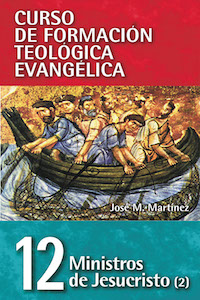 Martínez wrote two volumnes on what he defined as care for the souls.
Martínez wrote two volumnes on what he defined as care for the souls. In his book on biblical hermeneutics he observed that “on the journey of interpretation, dogmatism is always an unreliable companion”. Dogmatism should be replaced by humility “for we know in part and we prophecy in part” (1 Corinthians 13:9). This becomes clear “especially when considering texts that are interpreted differently by brothers who are equally respectful as regards the veracity and authority of Scripture”. In these cases “we must avoid the arrogant attitude of those who consider themselves to be pretty much infallible in their exegetic or theological pronunciations”.
He showed this same attitude in his much appreciate study on the theology of prayer, which accompanies a commentary on the so-called “Lord’s prayer”, “Abba, Father” (1990). In order to understand Martínez’s work it is important to understand the influence that the German pietism movement had on him – and which is probably less known in the Spanish language than the puritan tradition; although they are both equally misunderstood by many, who attribute all the evils of hypocrisy and legalism to them.
In that light his “Introduction to Christian Spirituality” (Introducción a la Espiritualidad Cristiana, 1997) is very useful. This book continues to be a unique book in the Spanish language. His perspective is highly attractive, taking the failure of materialism and the desire for transcendence in the world as its starting points, considering Christian spirituality with a masterful explanation of sanctification and Romans 7–8. The second part provides an impressive overview of spirituality in Church History from an evangelical standpoint. He furthermore shows a laudable balanced attitude towards the charismatic perspective.
BALANCED THEOLOGY
That quest for balance is, for many, Martínez’s most valuable characteristic. In “Theological foundations of Christianity”, he himself observes that “readers may consider that the book is imprecise in certain regards”, because they would like to find “clearer and more dogmatic positions” on controversial doctrines. The author however believes that “once the basic truths as they are clearly set out in Scripture are secured, it is always dangerous to go any further, making additional and less clear points, axes to grind in relation to issues on which people hold opposing views, even among Christians who have an equal love for God and his Word”. In this regard, he considers that “dogmatism is in general not a source of greater enlightenment but of antagonism, providing little edification”.
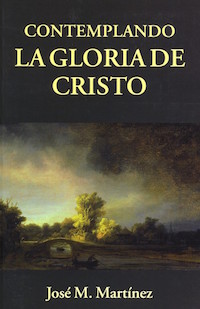 According to Martínez, Christ is not only the centre of the Christian message, but also the key of the new of a convert.
According to Martínez, Christ is not only the centre of the Christian message, but also the key of the new of a convert. Accordingly, when the debate on eschatology blossomed in the 1960s, Martinez kept a clear distance to both postures, although he did not consider himself a dispensationalist, but rather a historic premillenniarist. The same happened with the bitter confrontation between Calvinists and Arminians, which he experienced in his own church. Although he re-edited the book that he had written with Ernesto Trenchard, “Chosen in Christ” (Escogidos en Cristo), a number of times, he displayed a generous attitude towards the following generation of reformers in Spain.
His position regarding the charismatic issue in the 1960s was also very balanced. Although his ecclesiology was always Baptist and independent, he wanted people from different denominational backgrounds to participate in the Spanish Evangelical Alliance. He was behind invitations to several pastors of the Spanish Evangelical Church to Alliance activities, despite their many past doctrinal differences.
It is true – as John Stott says – that balance is not always a Christian virtue, biblically speaking. However, few people have followed Stott’s example as faithfully as José Maria Martínez. His work is a model of biblical balance, in the best meaning of the word. His words are always the product of careful consideration, combined with an attitude of grace, and the humble reaction of those who can allow themselves the generosity of mercy because they serve a God of love and truth.

Las opiniones vertidas por nuestros colaboradores se realizan a nivel personal, pudiendo coincidir o no con la postura de la dirección de Protestante Digital.
Si quieres comentar o